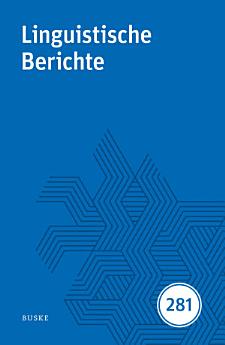Vorwort – Nina-Kristin Meister & Markus Steinbach: Barrierefreie Publikationen Beiträge aus Forschung und Anwendung - Clare Patterson, Umesh Patil, Caterina Ventura, Maria Lialiou, Petra B. Schumacher & Stefan Hinterwimmer: Why register might be more important than modality for the choice of demonstrative pronouns Abstract: Demonstrative pronouns have been shown to direct the attention to an entity that is currently not the most prominent entity in discourse. German poses an interesting puzzle because two of its demonstrative pronouns have very similar interpretive preferences. Patil et al. (2023) suggest that the 'der'-demonstrative (DPro) considers the perspectival anchor as the most prominent entity, while the 'dieser'-demonstrative (DemPro) is insensitive to the perspective holder, rendering distinct interpretive biases, whereas Patil et al. (2020) showed that DemPro prefers the formal language register, and further suggested that DPros avoid the written modality. Here we test a long-held explanation for the availability of two demonstrative pronouns, namely that the DPro is preferably used in the spoken modality, while the DemPro favours the written modality. In two sets of experiments, we directly compare the acceptability of the two demonstratives between spoken and written modalities. The experiments showed mixed results. While Experiment 1 registered no effect of modality, Experiment 2 revealed higher ratings for the DPro in the spoken over the written modality. We argue that the findings can be reconciled by considering register differences in the two studies, where items from Experiment 1 point to a more formal register than the items in Experiment 2. Overall, we suggest that register might be a stronger licensor for the choice of demonstrative pronouns than modality. – Jana Hasenäcker, Juliane Wettmann & Frank Domahs: Kann Leichte Sprache zu leicht sein? Eine zielgruppenorientierte Studie zur Wirksamkeit der Genitivvermeidung Abstract: Easy-to-read German (Leichte Sprache) is a linguistic variety used to improve the comprehensibility of texts for a target group with specific needs. Guidelines for the use of easy-to-read German advise, among other things, the avoidance of the genitive and recommend substituting it with a datival phrase with 'von'. This is debatable for two reasons: First, this strategy cannot be applied to all types of the genitive constructions and, second, its usefulness has not been empirically substantiated. Previous empirical studies on this subject suffered from methodical flaws and a lack of statistical power. By applying a reading comprehension test, the present study seeks to find out whether the use of a 'von'-phrase instead of the genitive really holds advantages for reading comprehension. Thirty-seven adults with intellectual disabilities were asked to read 32 focus sentences, 16 containing a possessive genitive and the other 16 containing an analogous 'von'-phrase. Participants' comprehension regarding ownership or belonging as indicated in the sentences was examined through single-choice questions. The analysis of the responses showed that there were no significant differences in the understanding of the genitive and the 'von'-phrase. This was independent from the salience of morphological case marking and from the length of the sentence. Furthermore, there was no evidence for an influence of individual reading abilities for words and pseudowords or individual reading frequency. These results question the need of a general rule to avoid genitives in Easy-to-read German. – Lea Schäfer: Variation oder Wandel? Der Fall von selbst und selber Abstract: As with many languages, the Germanic languages have intensifiers to mark reflexive structures. In standard German, this is usually done with the particle 'selbst' or with a "stilistic variant" (Siemund 2000: 10) 'selber'.








